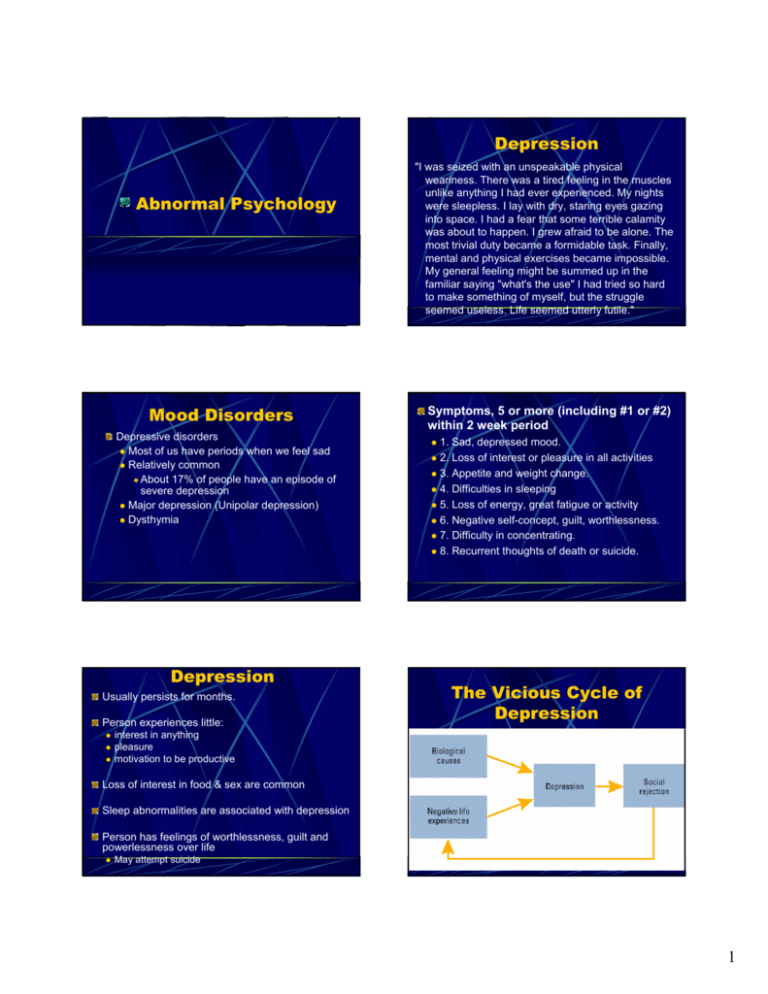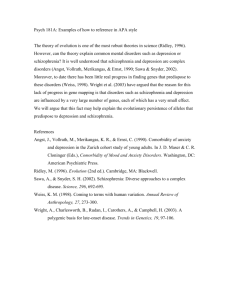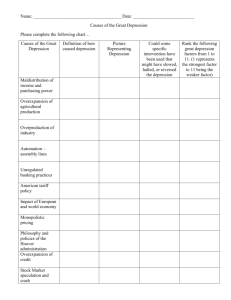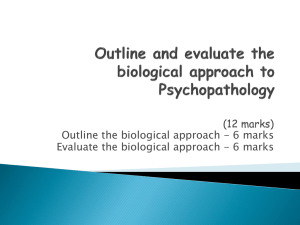Depression The Vicious Cycle of Depression
advertisement

Depression Abnormal Psychology Mood Disorders Depressive disorders z Most of us have periods when we feel sad z Relatively common z About 17% of people have an episode of severe depression z Major depression (Unipolar depression) z Dysthymia Depression Usually persists for months. Person experiences little: z z z "I was seized with an unspeakable physical weariness. There was a tired feeling in the muscles unlike anything I had ever experienced. My nights were sleepless. I lay with dry, staring eyes gazing into space. I had a fear that some terrible calamity was about to happen. I grew afraid to be alone. The most trivial duty became a formidable task. Finally, mental and physical exercises became impossible. My general feeling might be summed up in the familiar saying "what's the use" I had tried so hard to make something of myself, but the struggle seemed useless. Life seemed utterly futile." Symptoms, 5 or more (including #1 or #2) within 2 week period 1. Sad, depressed mood. 2. Loss of interest or pleasure in all activities z 3. Appetite and weight change. z 4. Difficulties in sleeping z 5. Loss of energy, great fatigue or activity z 6. Negative self-concept, guilt, worthlessness. z 7. Difficulty in concentrating. z 8. Recurrent thoughts of death or suicide. z z The Vicious Cycle of Depression interest in anything pleasure motivation to be productive Loss of interest in food & sex are common Sleep abnormalities are associated with depression Person has feelings of worthlessness, guilt and powerlessness over life z May attempt suicide 1 Depression: Age of First Onset Events That Precipitate Depression Severe losses early in life increase vulnerability to depression later in life. Lack of social support also increases vulnerability to depression Person’s interpretation of negative event influences their degree of depression. The way people think about their lives and the course of the events may also play a role Bipolar Disorders Manic-depression z z z Cycles between depression and mania Relatively rare 2% of population Mania z z z z z Periods of very high energy Rushed speech Often overly confident Make grandiose plans Little need for sleep Cyclothymia Rapid mood swings are shown in brain activity Therapist says to client " Well, you seem pretty happy today" Client "Happy! Happy! You certainly are a master of understatement. You rogue! Why I'm ecstatic. I'm leaving for the West Coast today, on my daughter's bicycle. Only 3100 miles. That's nothing, you know, I could probably walk...but, I want to be there by next week. And along the way I plan to contact a lot of people about investing in my fish equipment. I'll get to know more people that way--you know doc, "know" in the biblical sense (leers at the therapist). Oh, God, how good it feels. It's almost like a nonstop orgasm" Suicide • Depression & bi-polar can lead to suicide • Suicide rates vary significantly with age, race, and sex • Men are more likely to commit suicide than women • Whites are more likely to commit suicide than blacks ©1999 Prentice Hall 2 Sex Diffs in Depression Sex Diffs in Depression Equally common in boys and girls before puberty Hormonal Diffs? Afterwards, women are twice as likely to experience depression as men Coping Style Diffs? Why the sex diff after puberty? Understanding Mood Disorders Biological factors z Tendency to develop mood disorders is heritable z z z z Particularly bipolar disorder Genetic role in depressive disorders not as clear Women experience more rapid hormonal changes than men do (menstrual cycles, pregnancy, childbirth and menopause) z z Men generally try to distract themselves when they are feeling depressed, z Women tend to dwell on their feelings more. z Ruminating may not be useful for coping and may make the person feel worse. Understanding Mood Disorders Cognitive perspective z Cognitive triad Negative thoughts about the self Negative view of the future z Feel unable to improve the situation z Neurotransitters: Serotonin, Norepinephrine Brain damage: left anterior/prefrontal cortex z z Attributions z z Cognitive Aspects of Depression Explanatory style: a tendency to accept 1 kind of explanation for success or failure more than others z We’re more consistent in the type of attribution that we use to explain failures Causal explanations people make when bad things happen Depressive Realism Bipolar Disorder: Causes Primarily biological Not one gene Gets worse over generations. Person who blames self for all failures has a pessimistic explanatory style. z z z “I failed my Psyc test b/c I’m a dumb-ass.” They view failures as global (consistent over situations) and stable (consistent over time) A pessimistic explanatory style is positively associated with depression 3 Dissociative Disorders What if you feel depressed, if a roommate or friend seems depressed? Do not offer a diagnosis. Talk to someone, get help. z Talk to someone who knows what they are talking about. z z Schizophrenia Group of disorders characterized by severe personality disorganization, distortion of reality, and inability to function in everyday life z NOT multiple personalities Most frequently diagnosed in young adults Onset is typically sudden, although there are some markers during childhood z z z z being “strange” short attn. span having few friends disruptive in class Common dissociative experiences z Not recognizing yourself in a mirror: 3% z Standing next to yourself, watching: 15% z Finding unfamiliar notes that you must have made: 25% z Driving home and not remembering the trip: 35% z Being able to ignore pain 65% Symptoms - for at least one month 1. Thought Disturbances 2. Disturbances of Perception and Attention 3. Motor Disturbances. 4. Affective Disturbances Understanding Schizophrenia Heterogeneity Catatonic- lots or not enough movement. mutism, echolalia. Disorganized- disorganized speech, behavior. Inappropriate or flat affect, no catatonia Paranoid- delusions and auditory hallucinations. Undifferentiatied- doesn’t fit a category Residual type- 1 episode, no prominent positive symptoms. Odd behavior and beliefs. Sociogenic hypothesis. Low SES Æ SZ Mother -- double bind messages from the mother Genetic predisposition for schizophrenia Dopamine z z Too much dopamine in mesolimbic system Not enough dopamine in prefrontal areas Social issues z Role of stress in development or schizophrenia 4 Causes: Brain Damage Brain scans indicate that: z z Hippocampus and parts of cerebral cortex are a little smaller than normal Schizophrenics have smaller neurons and fewer synapses in the prefrontal cortex Causes: Neurodevelopmental Hypothesis Result of nervous system impairments that develop before or at birth. Impairments may be due to genetic or other reasons: poor prenatal care z difficult pregnancy and labor z mother’s exposure to influenza virus z Urban schizovirus z Causes: Brain Damage • Pair of identical twins, discordant. • Schizophrenic had enlarged ventricles (see arrows) compared to normal sibling Dissociative Identity Disorder Multiple Personality z z Existence in a single individual of two or more distinct identities or personalities that alternate in controlling behavior Alternate personalities z Often have characteristics that are very different than the primary identity z z z Hostility Controlling Aggressive Often primary identity is not aware of “alters” z Alters can have different handwriting styles, artistic or athletic abilities, knowledge of a foreign language Multiple personalities as a defense mechanism z z May relieve emotional pain Extremely rare disorder z May be overdiagnosed in individuals who are highly suggestible Last Word on Behavior Disorders There are no behaviors that are absolutely normal or absolutely bizarre z z Not a dichotomy Continuum of behavior z z All of us exhibit some behaviors that might be considered odd or eccentric This does not mean that we have a behavior disorder z z Normal variability of behavior In other words, don’t start diagnosing your friends and family… 5








